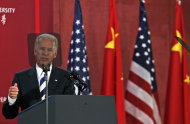M WAQAR..... "A man's ethical behavior should be based effectually on sympathy, education, and social ties; no religious basis is necessary.Man would indeed be in a poor way if he had to be restrained by fear of punishment and hope of reward after death." --Albert Einstein !!! NEWS,ARTICLES,EDITORIALS,MUSIC... Ze chi pe mayeen yum da agha pukhtunistan de.....(Liberal,Progressive,Secular World.)''Secularism is not against religion; it is the message of humanity.'' تل ده وی پثتونستآن
Sunday, August 21, 2011
Biden says China, US share global responsibilities
U.S.Vice President Joe Biden reassured China on Sunday on the safety of its U.S. debt holdings and said the United States and China need to recognize their mutual global responsibilities and ensure greater fairness in trade and investment conditions.
Biden brought a strong message of mutual interdependence on his visit to the southwestern Chinese city of Chengdu on the final day of a five-day visit to the world's second-largest economy and key U.S. trading partner.
And, as he did earlier in his visit, Biden endeavored to ease China's concerns over its $1.2 trillion in U.S. Treasury holdings despite the massive U.S. deficit and downgrading of America's credit rating, saying, "You're safe."
"We could not afford not to make good" on U.S. commitments, Biden told students in a question-and-answer session following a speech at Sichuan University.
Biden noted that the interest rate on Treasurys fell following the downgrade, making them more sought-after than ever.
"If the world thought, my God, they've been downgraded and they're not going to make good on their debt, it would not have been viewed as the safest haven in all the world to invest. We are still the single-best bet in the world in terms of where to invest," he said.
Since Americans own 85 percent of the national debt, any politician that defaults would have to disappoint them, and "no politician wants to do that," he said.
Biden emphasized the frequent exchanges between President Barack Obama and Chinese President Hu Jintao along with government officials in the political and economic field. He said there needed to be more exchanges between their civilian and military leaders over security issues, especially on cybersecurity and maritime issues where the sides view matters from different perspectives.
"The fact is, China and the United States face many of the same threats and share many of the same objectives and responsibilities," Biden said. "Our generals should be talking to each other as frequently as our diplomats."
Military-to-military exchanges have a troubled history, with China suspending them to register its anger at U.S. actions on the political front or toward Taiwan, the U.S. ally Beijing claims as its own territory. Though revived last year, they face a new threat when the U.S. announces on Oct. 1 whether it will provide new F-16 warplanes to the island.
Biden said the U.S. and China both need global stability, including preventing Iran and North Korea from obtaining nuclear weapons. He also reasserted that the U.S. will remain a Pacific nation in the future, saying that the American presence had benefited regional stability and allowed China to focus on economic development.
"Asia and the United States are not separated by this great ocean. We are bound by it," he said.
Biden said he recognized frustrations among many Chinese businessmen and officials at the time needed to obtain visas to visit the U.S. and said Washington was working on improvements.
But he said U.S. companies continue to face major investment barriers in China, a frequent complaint among the business community here. He said U.S. businesses were locked out of entire fields and face "restrictions that no other major economy imposes on us or so broadly."
Chinese and U.S. prosperity is key to reviving the global economy and no serious problems can be resolved without Beijing and Washington at the table, Biden said.
"We're the two biggest engines in the world to be able to do that," he said.
The U.S. relishes competition from China and hopes for continued Chinese prosperity, with the $110 billion in U.S. exports to China last year generating hundreds of thousands of jobs, Biden said.
Biden was to spend the rest of the day Sunday visiting sites with his Chinese counterpart, Xi Jinping, who is expected to become the country's next leader.
Subscribe to:
Post Comments (Atom)

No comments:
Post a Comment